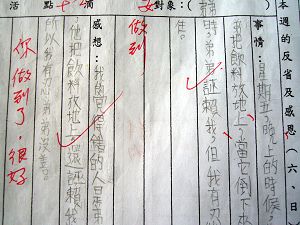(Clearwisdom.net) An autistic boy who was known for his aggressive behavior was a problem for the faculty at his school. All the other students avoided him. However, in less than two years, this boy has changed into a self-disciplined person who is considerate of others. What made him change?
Yangyang already had symptoms of autism during his first two years at school. His mood was unstable. Sometimes he made messes in class and caused trouble for his teacher. His classmates had to be very careful around him. His condition deteriorated when he was in third grade, as he became offensive, restless and anxious. He was often in conflict with others around the school, extending his classroom disturbances to the general campus. He dropped fire extinguishers from upstairs, threw a broom at a teacher's back, and chased and beat other people. His unpredictable actions made it impossible for his advisor to handle him. His mother came to school about every other day, but it did not help.
The Change
Yangyang joined a new class in fifth grade. His new advisor, Mr. Li Changbai, believes he has a predestined relationship with him and accepted him into the class without concern. He came up with some ideas of how to guide Yangyang.
Mr. Li told his pupils' parents during a meeting about an education philosophy that emphasizes virtue. Teaching children the principles of Truthfulness-Compassion-Forbearance establishes a solid moral foundation for them. Because Mr. Li himself practices Falun Dafa, he attaches importance to the improvement of virtue, and demands of himself to treat others extremely well. He has benefited both physically and spiritually from the practice of Falun Dafa. He encourages the children to read Zhuan Falun and learn to be a good person, one who is genuine, compassionate, and forbearing in his or her everyday life. All the parents present agreed with him.
Mr. Li schedules a short noontime break for reading Zhuan Falun and sharing experiences on dealing with everyday issues based on the principles of Truthfulness-Compassion-Forbearance. He treats Yangyang with even more forbearance while pointing out his mistakes if needed. At the same time, he encourages the compassion of the whole class, and they help Yangyang collectively.
Soon, there was an obvious change in Yangyang, who has stopped talking and interrupting while Mr. Li was teaching. As Yangyang gradually established his moral values, he has become increasingly able to tell right from wrong, and good from evil.
Behavioral Changes
Mr. Li reinforces the principle of Truthfulness-Compassion-Forbearance in the students with stories of virtue as class supplements, and with his own behavior and speech. Also, he interacts with the students in their journals, where students examine their own words and deeds, and record their good deeds.
|
|
Reading Zhuan Falun every noon helps Yangyang. The deeper he understands Truthfulness-Compassion-Forbearance, the better he is at controlling himself. He becomes capable of distinguishing right from wrong and corrects his behavior accordingly. He can admit his faults and apologize. The changes that happened to Yangyang's mind and behavior have been recorded in his journal.
One Sunday Yangyang's family went to a shopping mall. Someone's shopping cart rolled on his foot, but that person didn't apologize. Yangyang wrote, “I can tolerate this. Because he didn't mean it, I can forgive him.”
Yangyang often had conflicts with others in the past over minor matters. No matter whether others had done something intentionally or not, he always interpreted it as them wanting to bully him, and he fought back. Now, he is willing to look at the causes of conflicts, to control his moods, and to discipline himself. Yangyang changed from being autistic to a person who cares about other people and his surroundings. He wrote, “On Friday I went to pick up lots of trash, because picking up trash can not only eliminate my karma but also protect the Earth.”
“On Friday night, my younger brother dropped a drink on the ground. When it tipped over, he blamed me for it, but I tolerated it.”
As his understanding of compassion becomes deeper, Yangyang can control himself more easily not to do bad things. Mr. Li said, “Although he cannot do everything 100% right yet, he has improved 80-90%. For the things he didn't do right, he can realize it later and examine himself.”
For example, Yangyang wrote, “On Sunday afternoon my brother hit me and I hit him back. I failed to forbear.”
He also wrote, “On Sunday night my brother called me an idiot. I asked him who an idiot's brother and parents are. He said they are little idiots and super idiots. So I told my mom, and everybody laughed. Fortunately I didn't feel angry, because I am adaptable.”
Feedback from Others
Other teachers also have noticed Yangyang's changes. It's like suddenly there is no one wandering around the campus, like Yangyang used to do frequently. Several teachers happened to ask Mr. Li, “Why didn't I see Yangyang recently?”
Yangyang used to be worst at English. In the second semester of the fifth grade, the English teacher mentioned to Mr. Li that Yangyang can now sit quietly in the class, rarely disturbs other students, and occasionally answers questions.
Sometimes Yangyang disturbs the class and is brought to the counselor's room. Yangyang said to the counselor, “Mr. Li Changbai teaches me to follow Truthfulness-Compassion-Forbearance. I know I didn't do well. I didn't follow forbearance.”
In the second semester of the sixth grade, a teacher asked Mr. Li for advice on how to manage his class. When he heard Yangyang's story he said, surprised, “Yangyang is in your class? I thought he was transferred to another school.”
Once a boy who threw brooms at teachers' backs and needed someone to take special care of him, Yangyang makes people forget all the troubles of the past. The changes that he has gone through are so amazing that people could not but be grateful and admire the power of Truthfulness-Compassion-Forbearance, that cultivates people's minds.








